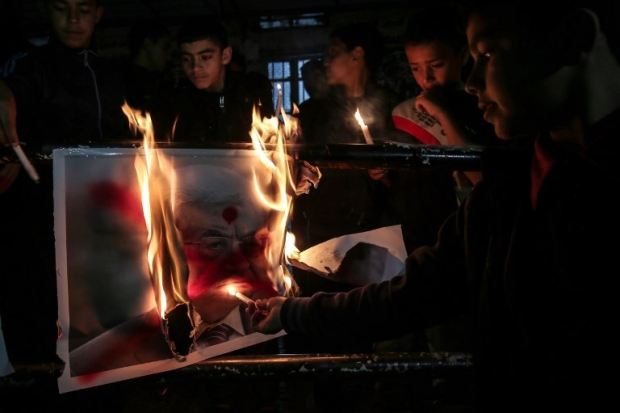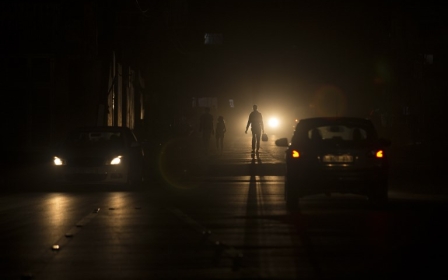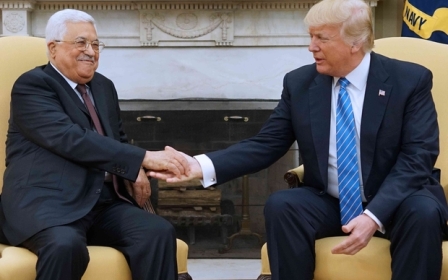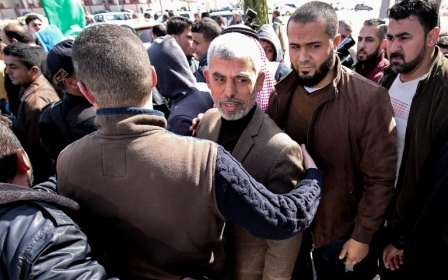Mahmoud Abbas has led the Palestinians to a dead end. He must go
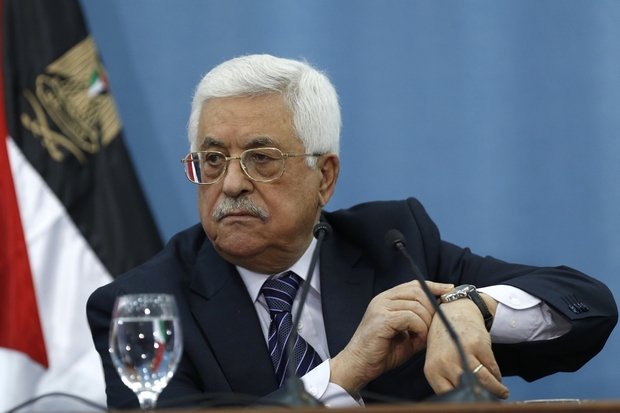
The embattled 81-year-old Palestinian president, Mahmoud Abbas, has been in power since 2005. His reign has not brought the Palestinian people any closer to freedom and independence, but where is he leading them to now?
Abbas’ setbacks and failures have put the Palestinian cause in the worst position it has been since Israel’s creation in 1948
Abbas was elected president of the Palestinian National Authority (PNA) in January 2005 following Yasser Arafat’s death under suspicious circumstances in November 2004. He is president of the state of Palestine, leader of Fatah and chairman of the PLO. He is committed to negotiations with Israel based on a two-state solution, and has been since he signed the 1993 Oslo Accords on the White House Lawn to great cheers.
In short, he has played a hugely significant role in leading the Palestinians as a negotiator, a prime minster and a president and, while the blame for his administration’s failure can be shared among a number of key personnel, he set the overall direction of travel and must therefore carry the can for its disastrous consequences.
Under his watch, the Palestinians scored a small number of successes, including an upgrade of Palestine’s membership of the United Nations to a non-member observer state in 2012 allowing it to join several international organisations including UNESCO and the International Criminal Court. This was part of a strategy to internationalise the conflict.
Abbas may well argue that another of his successes has been the security coordination with Israel instigated under Oslo. It is one of the strongest cards Palestinians have to threaten Israel. Abbas has, however, called it “sacred”, arguing, “If we give up security coordination, there will be chaos here. There will be rifles and explosions and armed militants everywhere,”
Beyond this list, it is difficult to point to any other significant successes. On the contrary, Abbas’ setbacks and failures have put the Palestinian cause in the worst position it has been since Israel’s creation in 1948.
Peace process
The Oslo Accords were meant to deliver a Palestinian state within five years. Twenty-four years and countless negotiations between the Israeli and Palestinian side, mostly led for the Palestinians by Saeb Erekat, later, and there is no Palestinian state
And while 136 member states of the UN recognise Palestine, of the so-called international community, only Sweden has afforded this recognition to the Palestinians. Significantly, neither Israel, nor the US recognise Palestine as a state, arguing recognition should only come at the negotiation table.
The more Abbas gives, the more Israel and its American backers led by a fanatically pro-Israel team will want
The last significant attempt at peace talks, led by US secretary of state John Kerry, ended in complete failure in 2014 and was followed by Israel’s third war on Gaza in which more than 2,000 Palestinians were killed. As he was leaving office, Kerry laid much of the blame for failure of the talks at Israel’s door, singling out its settlement policy led by the “most right-wing” government in its history.
Israeli Prime Minister Benjamin Netanyahu promised the Israeli electorate that there would be no Palestinian state under his watch in 2015. A significant number of his cabinet colleagues are against a state ever materialising and believe in the annexation of significant chunks of the West Bank to Israel.
Abbas remains committed to restarting negotiations with Israel and is now banking on the Trump administration to launch another initiative.
Settlements
In 1993, the number of settlers in the West Bank including East Jerusalem stood at 148,000. By the time Abbas had taken over as president, they had reached 440,000. Under his presidency, the number has risen to almost 600,000.
They live in 127 illegal settlements "recognised" by the interior ministry as "communities" and about 100 illegal "outposts". In 2005, Israel vacated 16 settlements in Gaza under Ariel Sharon’s unilateral "disengagement" plan.
The ever rising number of settlers and settlements has for many analysts already ended the prospect of a viable Palestinian state emerging.
Relationship between PNA and Hamas
Ever since its creation in 1987 shortly after the start of the first intifada, Hamas has pursued a significantly different approach to the conflict than Abbas’s Fatah party based on the liberation of historic Palestine and the establishment of an Islamic state in the area.
Left with no hope of a just solution that brings them freedom, the Palestinian people will rise again
In 2006, it decided to combine its military strategy with participation in the Palestinian Legislative Council (PLC) elections which it won handsomely. Abbas accepted the results and asked Ismael Haniyeh to form a government, which was then boycotted by the international community.
Following a bloody confrontation between Fatah and Hamas in Gaza in 2006, Israel imposed a siege on Gaza which continues to this day. The Egyptian border crossing at Rafah has effectively been closed since January 2015.
Despite many attempts at reconciliation between the two factions, the division between Hamas and Fatah remains deep. Hamas rules Gaza and Fatah rules the West Bank. The two million Palestinians of the Gaza Strip have paid a heavy price for this division.
Price paid by Palestinians in Gaza increases - again
Frustrated by a lack of progress in ending the division, but perhaps playing to the Israeli and American gallery under US President Trump, Abbas has recently undertaken several steps to pressure Hamas which may result in the formal separation of Gaza from the West Bank.
In recent weeks, he slashed the salaries paid to 60,000 civil servants in Gaza and informed Israel that the PNA would no longer pay for the electricity it supplies to Gaza which has reduced the supply to the strip to a couple of hours a day.
This hits not only ordinary Palestinians hard, it also hurts vital services such as hospitals and sewage treatment works. The PNA has also reportedly cut its funding to the medical sector depriving it of badly needed equipment and medicines.
Many that I have spoken to both inside Palestine and in the diaspora described this as "shameful". “How can Abbas impose collective punishment on his own people while maintaining security cooperation with Israel?” one asked.
If Mahmoud Abbas thought his actions would hurt Hamas and bring it to heal, then he has once again miscalculated badly. Reports have emerged of talks between Hamas and Abbas’s arch-rival Mohammed Dahlan which could see the latter return as leader in Gaza.
And if Abbas thought his hard-line approach against Hamas would endear him to Trump and his senior advisers then his recent, frosty meeting with Jared Kushner surely confirms the opposite. The more he gives, the more Israel and its American backers led by a fanatically pro-Israel team will want.
This time his actions against Hamas may give the Americans something Israeli leaders crave: a final separation between Gaza and the West Bank. This would certainly fulfil Israeli Education Minister Naftali Bennet’s vision of a Palestinian state "only in Gaza" and the annexation of the West Bank, giving the Palestinians limited autonomy there.
Whatever strategy Abbas has followed is unravelling. He is leading the Palestinians to further fragmentation and separation.
It is time he admitted this and stood down. If not, then his own miscalculations could hasten the end of his rule. Even those around him that have benefited handsomely from his rule must now realise the game is up.
Left with no hope of a just solution that brings them freedom, the Palestinian people will rise again. This time it will be against their own expired leadership which has now denied babies and cancer sufferers in Gaza medical treatment for political purposes. The next intifada will be against the Muqata’a. This should worry Israel as much as Abbas.
- Kamel Hawwash is a British-Palestinian engineering professor based at the University of Birmingham and a longstanding campaigner for justice, especially for the Palestinian people. He is vice chair of the British Palestinian Policy Council (BPPC) and a member of the Executive Committee of the Palestine Solidarity Campaign (PSC). He appears regularly in the media as commentator on Middle East issues. He runs a blog at www.kamelhawwash.com and tw
The views expressed in this article belong to the author and do not necessarily reflect the editorial policy of Middle East Eye.
Photo: A photo of Palestinian President Mahmoud Abbas from 2016 (AFP)
New MEE newsletter: Jerusalem Dispatch
Sign up to get the latest insights and analysis on Israel-Palestine, alongside Turkey Unpacked and other MEE newsletters
Middle East Eye delivers independent and unrivalled coverage and analysis of the Middle East, North Africa and beyond. To learn more about republishing this content and the associated fees, please fill out this form. More about MEE can be found here.



